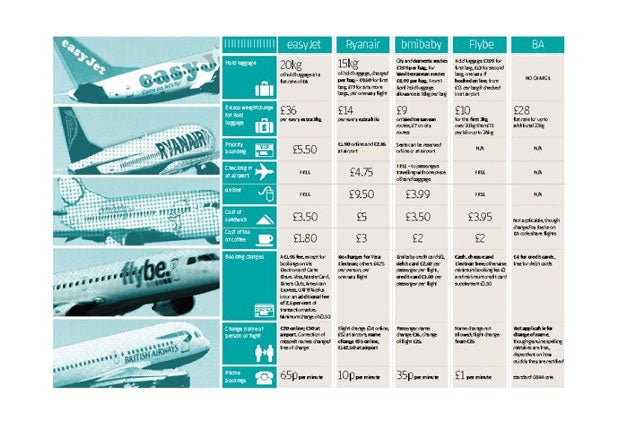Just how cheap are those no-frills flights once the hidden extras are taken on board?
Budget carriers are seeking new and ever more imaginative ways of charging for 'extras'. As the price of 'low-cost' air travel mounts, Mark Rowe looks at how bargain seekers are being brought down to earth with a bump

A pound to spend a penny? Not even Ryanair, surely, would charge passengers to use the toilet at 30,000ft, despite Michael O'Leary's recent flippant remarks on the subject. But there is a mind-boggling array of charges imposed by low-cost carriers that will ensure that the basic advertised fare is far removed from the amount finally taken off your plastic.
The charges add up quickly, to the point where fares can be higher than with full-service airlines, or the difference can be small enough to question the value of the savings. Everyone is now familiar with taxes being added on to their base fare, but it seems as if every aspect of the process of getting into an aircraft cabin will ratchet up the price.
Ryanair introduced baggage charges in March 2006, and was followed rapidly by most budget operators. Other ways of breaking down and charging for services have followed. One of the latest is the classification of a duty-free bag of shopping as hand luggage by some low-cost operators, with flat-rate fees required at the gate if this takes you over the weight or bag limit.
Low-cost carriers say the charges help them to cut fares, and are "100 per cent optional" (except, one assumes for the use of the toilet). But charges for extras, such as excess baggage, can add up quickly. A passenger flying with British Airways will pay £28 to check in 24kg of luggage one way; with Ryanair the same weight would cost you at least £135.50 one way; with easyJet this would be £78 one way.
Changing the flight would cost £24 online with Ryanair, £20 with easyJet and £40 with British Airways (on a restricted non-flexible ticket, plus the difference in price). But changing a passenger name would require you to tear the ticket up with British Airways, pay £95 with Ryanair and £20 with easyJet.
Taking a typical booking – travelling from London to Milan on 27 March and returning on 30 March – if you had booked last Tuesday morning you would have paid £47.77 with easyJet and £46.99 with Ryanair, compared with £138.70 for British Airways, including all taxes. But the charges outlined in our graphic opposite show that the low-cost carriers can quickly catch up with the add-ons, particularly if you have a significant amount of luggage.
Most of the charges can be avoided, but it depends on your willingness to invest time and thought into this, and also on whether circumstances enable you to travel lightly. Booking and checking in online, paying with Visa Electron, not being concerned about priority boarding and carrying no hold luggage will cut out most of the additional charges.
But such additions are here to stay: The general view of the Air Transport Users Council (AUC) and the Office for Fair Trading is that as long as the charges are transparent and reasonable, such measures are fair practice and legal.
"If the charges are simple and optional for things such as priority boarding and baggage, then it isn't really to the detriment of consumers," said James Freemantle, industry affairs manager for AUC.
But charges that are effectively compulsory are another issue. "Ryanair charges a flat £5 per transaction which is free if you use Visa Electron but we don't think that's really fair and is definitely less optional," said Mr Freemantle. "Most people would not find it practical to get a Visa Electron card just for a Ryanair flight. There has to be a limit to the charges that the low-cost carriers are dreaming up to impose on consumers."
The AUC has suggested a voluntary "cooling-off" period, in which passengers can cancel their reservations free of charge within 24 hours of making a booking."
Of further concern to passengers is that full-service airlines are increasingly adopting elements of the no-frills model. Many airlines, such as Czech Airlines and Iberia, charge for refreshments in economy class on a proportion of their European flights. BA has also introduced charges for bookings by credit card and a fee for changing a flight.
"BA is getting closer to the no-frills model," said Mr Freemantle. "In the future we will see the full-service airlines moving towards the low-cost carriers. At the moment, there are people who will pay for the full service but it will eventually come down to price.
"That's a concern because consumers would no longer have a choice of the kind of service they want."
Join our commenting forum
Join thought-provoking conversations, follow other Independent readers and see their replies
Comments